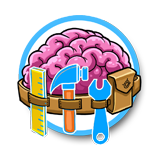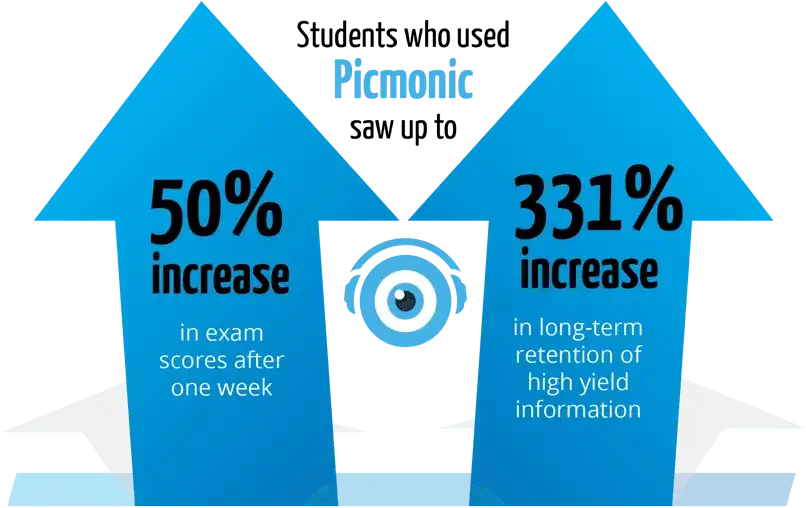It takes time to learn, and oftentimes, you learn something new every day. The question is, do you remember what you learn long term? Higher education students learn new concepts in class, study them for a big exam, and eventually use that knowledge in their profession—or they may forget it entirely.
You may believe that learning is the beginning of a long, strenuous journey, but in reality, you can pave the way to accelerated learning. Simply use memorization strategies to learn faster and remember more!
If you need to remember without forgetting important information, read the following five memorization strategies to get to learning and remembering.

Top 5 Memorization Strategies
The following five memorization strategies are effective, scientifically proven methods to remember more and learn faster.
1. Link your facts
Linking is learning by association. This isn’t exactly the traditional associative learning you learn in psychology. Instead, linking is when you learn something new and relate it to something you already know. Your brain has a network of known information, so once you build a connection (a link) to something you’ve previously learned, you can easily identify the similarities and differences to learn the new information.
2. Quiz yourself
You need to know how to learn faster and remember more for exams, so it’s best to start with your own quizzes. Why would you do that? Exams are stressful, but low-stakes quizzes are a great start to understanding what you already know and what you don’t. You can use your quiz results to focus on your struggling topics and recall the important information you need without forgetting.
3. Use spaced repetition
You know the sequence wash, rinse, and repeat all too well. Now, take this approach to your study methods. Learn, review, quiz, and repeat. Not right away, of course! Take your time. Study or quiz yourself every other day, every two to three days, or whatever works best for your schedule. As long as you space it out and let your brain rest.
4. Try mnemonic devices
Mnemonics are handy dandy memory devices, and there are all kinds of them. Mnemonics range from acronyms like PEMDAS, models like Venn diagrams or brain maps, rhymes or songs like your ABCs, pictures with vibrant colors or unique characters, and organization methods like Cornell notes. There are tons of mnemonic devices out there, but the gist is that they’re cheat codes for your brain to recall information quickly and remember it long-term.
5. Create your own approach
Customization is an efficient memory strategy. Studying should be a unique experience for everyone, so you should tailor your study plan to you. Whether it be flashcards or group studying, reading out loud or listening to classical music, studying weekends or weekdays, take an individualized approach to your studying method to increase your memory retention.
Picmonic is a study tool with your success in mind
Wouldn’t it be nice if there was a program for healthcare students that used the memory strategies above? News flash, there is! Picmonic is a research-proven study tool with picture mnemonics, quizzes, built-in spaced repetition, and customization tools to help all kinds of healthcare students learn, pass their exams, and retain information long-term.
Here’s how it works:
- Related facts: Picmonic makes it easy to differentiate between similar facts, shows related facts, and maintains consistent characters across the board so you easily associate information and remember it long-term.
- Quizzes: Test yourself with built-in rapid review multiple-choice quizzes. They’re low stakes and help improve retention.
- Spaced repetition: Our smart software algorithm helps you review before you forget! It gradually increases intervals of time between review and learned material to both maximize retention and recall.
- Picture mnemonics: Picmonic uses fun, unforgettable characters and stories to cover thousands of topics for healthcare students. With quick two-minute videos, you learn more in less time.
- Personalization: Our home screen will identify your weak areas and recommend important categories for you to focus on. You can even generate your own mnemonics to strengthen your memory.

Why these memorization strategies work
Don’t just take our word for it. Here’s why these are some of the most efficient memorization strategies.
1. Association
Internal associations are conscious and intentional, engaging your existing memory network. If you add a new piece of information to a memory that already exists, you’re increasing the likelihood of remembering it. To make sure you’ll recall it by association, make sure the memory is personal, vivid, or relevant.
2. Quizzing
A scientific paper in the Journal of Experimental Psychology: Learning, Memory, and Cognition lists the benefits of testing yourself often. By asking yourself questions about what you learned, you have a bigger chance of retaining the information than simply studying. And, by testing frequently, you’re more likely to remember your mistakes, wrong answers, and correct answers. This will make the information easier to remember and retrieve in the future.
3. Repetition
Spaced repetition is scientifically proven to help you remember. If you’re struggling to remember, repeat the information. And if you do remember, it’s okay to revisit the topic less, but make sure you do not forget it entirely. Repetition offers an opportunity for effortless learning. Unlike cramming, it allows you to learn quickly. Essentially, you’ll constantly remind your brain that this is the important information you need to recall.
4. Mnemonics
Mnemonics allow students to remember more with greater accuracy. It uses memory science to appeal to your brain’s way of categorizing information. Mnemonics sort of flag your brain and tell it it’s important to store in long-term memory. With mnemonics, your memory recall is faster and your memory retention is stronger.
5. Customization
One study on personalized goal setting and study planning showed it improved learning engagement and overall performance in pharmacy students. Personalized learning comes in different shapes and forms. Whether you prefer learning on the go or finding a new way to study, personalizing your plan is key for remembering important information.
Learn faster and remember more with Picmonic
With a Picmonic subscription, you’ll learn more in less time. Our comprehensive library is vital to healthcare students across the board. In a randomized, double-blind, controlled study, the Picmonic Learning System was compared to text-based material (like textbooks and lecture notes) and found that medical students improved by 331% in long-term memory retention and increased test scores by 50%. Oh, and speaking of boards, we guarantee students will pass their board exams.
Join today to get started.













